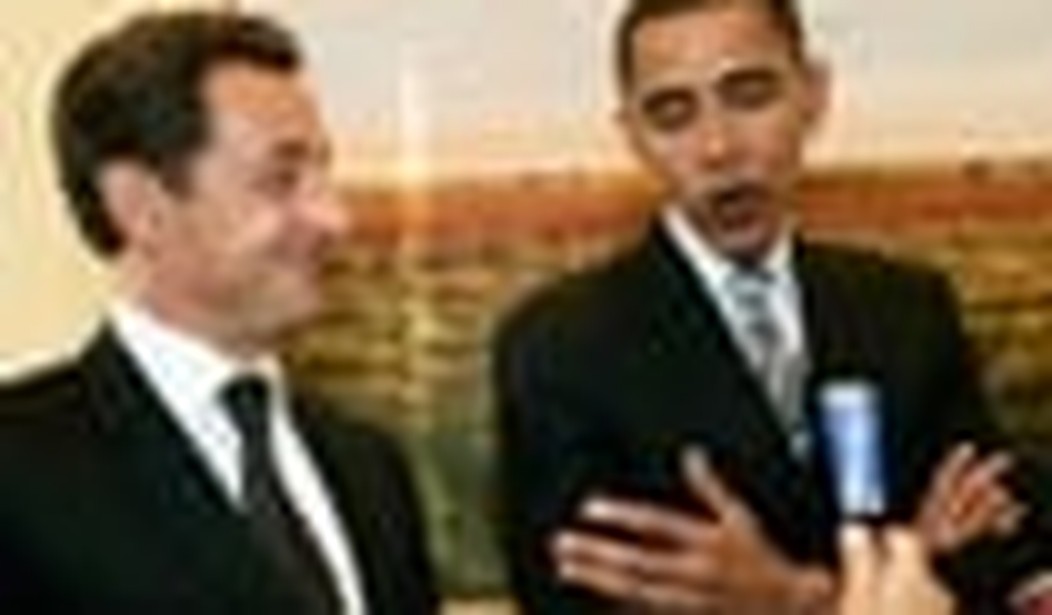Today Paris welcomes Barack Obama in the latest stage of his pseudo-presidential world tour. The media is not exactly in a frenzy. Neither (one suspects) is the populace. The former are more concerned with domestic French issues such as the effective ending of the 35-hour week, the announcement of the French equivalent of BRAC, and President Sarkozy’s intention to reduce VAT on restaurant bills.
Below that, the news sites report the embarrassing leak of nuclear material at the Tricastin reactor on the Rhone — the fourth nuclear incident in the last 15 days — and a story on WTO negotiations (Sarkozy says NO) before getting to the senator. One suspects that the populace is focused more on “les vacances” than any of the above. However, if they are paying attention to the news then they probably share the media’s sense of priorities.
Yet just as Reuters reports about Germans, the French do seem for the most part keen to welcome “le John Kennedy noir” (the black JFK) as AFP describes him. The media also is mostly welcoming. Le Figaro, in an article headlined “Obama discovers a Europe already conquered,” calls him the antithesis of Bush and also reports that 84% of the French have a favorable opinion of him compared with just 33% having a favorable opinion of McCain. The article also touches on the “JFK factor” and comments that even though Europe would welcome pretty much any non-Republican after Bush, Obama is even more welcome because of his opposition to the war in Iraq and his progressive ideas on social issues.
Europeans, according to the newspaper, see him as the true candidate of change and the embodiment of the famous American dream. Le Figaro goes on to note that Europe’s leaders will welcome his pragmatism in foreign policy and his belief in “soft power.” All in all, Le Figaro reports, Europe expects him to be much more Europe-aligned in his positions on multilateralism, climate change, and so on. The only negative in the article is the last paragraph where it wonders whether Obama likes, or even cares about, Europe. When Obama headed the subcommittee on European affairs last year, he apparently neglected both the committee and Europe.
Le Monde is not quite as flattering, with an article headlined “The ‘presidential’ tour of candidate Obama.” It starts well, with the statement that it is difficult to believe that he is not already president, and then goes on to say that he continues to refine his international stature in the avid regard media. Then it becomes less positive, pointing out that McCain is less than happy with this media enthusiasm and noting the heavily scripted nature of Barack Obama’s Flying Circus. Le Monde also has an editorial which, as in the last paragraph of the Figaro piece, notes that while Europeans think they know Obama, the reverse is not so clear. It also notes his apparent dilatoriness as head of the senate subcommittee.
Differing from Le Figaro, the editorial writes that, while the people of Europe love Obama, their governments may be less keen. Obama, it notes, has made worrying protectionist noises and may make heavier demands than McCain concerning Afghanistan. It concludes with a quote from Reginald Dale (Director of the CSIS Transatlantic Media Network) concerning Obama’s flip-flopping. “If he senses criticism he changes but he never repudiates his initial position.”
On the small screen a similar pattern of coverage emerges. France 2&3 (the state-run channels) reflects Le Monde‘s view that the tour is just a show for the folks back home, but it doesn’t really say anything nasty about him. Meanwhile, TF1, like Le Figaro and AFP, is more positive, using the same images of a Europe already conquered and also drawing parallels with JFK.
It may be that the two approaches are different sides of the same coin. France desperately wants to love Obama but secretly (or not so secretly) fears that Obama doesn’t love it back in return. However, it could also be that Le Monde and France 2&3 are reflecting the French government’s more nuanced viewpoint, while TF1, Le Figaro etc. reflect the views of the population at large. Certainly it makes sense for the French leadership (and other European governments) to hedge their bets somewhat and not insult McCain in case he ends up becoming president.
Indeed, both President Sarkozy and German Chancellor Angela Merkel are in many ways more attuned to the McCain message, as are, for that matter, Berlusconi in Italy and a number of Eastern Europeans. Only in the unpopular Gordon Brown is Obama likely to find a leader who shares much of his political preferences.
Furthermore, with Obama’s somewhat contradictory positions on issues such as world trade, Afghanistan, and Iran (the latter a closer and greater threat to Europe than the U.S.), a wise European leader will not offer support without seeking clarification. Indeed, while Obama’s recently stated position on Iraq –that the troops and money spent on occupying it would be better used elsewhere– is one that Europe’s leaders agree with, they may not appreciate such pragmatism in other areas.
Europe needs the U.S. to be open to its exports and willing to not push for international actions that hurt Europe even if they benefit America. Obama’s focus on internal U.S. factors and his apparent disinterest in both foreign affairs and the effects of U.S. policies on other nations (such as troop withdrawal in Iraq) are definitely worrying for European leaders. In the 19th century Lord Palmerston famously said that Britain has no permanent friends, merely permanent interests.
One suspects that Sarkozy and his European colleagues hope that an Obama administration does not act the same way but fear that it might.








Join the conversation as a VIP Member